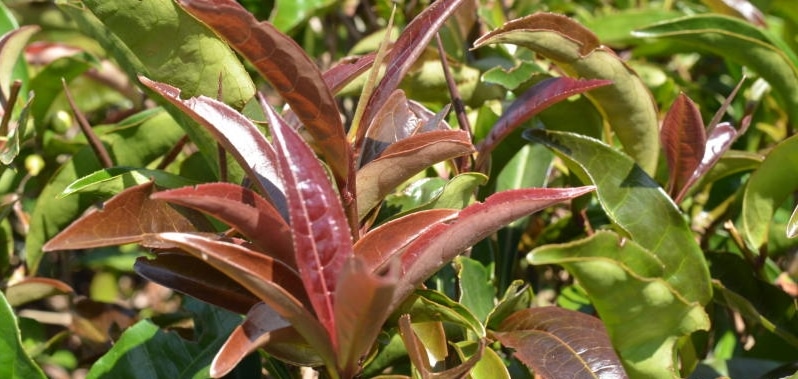Different tea varieties like black tea, green tea, white tea, or oolong, are all from the Camellia Sinensis plant. So in some senses, all teas are created equal, but some more equal than the others. That can be the case of purple tea. Start as a natural wild mutation of Camellia Sinensis; it is now mass-produced in Kenya. Loaded with fantastic health benefits, it can be the next best thing in the tea world.
Table of Contents
What is Purple Tea?
Purple tea is an exceptional variety of tea, mostly produced in Kenya. The natural wild mutation of the Camellia Sinensis plant was first found in China and India. But the Tea Research Foundation of Kenya is well-known for developing drought, disease-free variety, and gradually produce purple tea commercially. They spent 25 years in the development of purple tea cultivar. Purple tea cultivation is essential to the tea market in Kenya and has helped improve the life of farmers in the industry.
Growing in cool conditions at an elevation of 4500 to 7500 feet, purple tea leaves absorb intense sun rays daily. So the tea plants produce a lot of antioxidants as a defense mechanism to fight damage. As the result, the tea leaves contain super high level of anthocyanins and polyphenols.
Purple tea leaf has a distinctive, purple-reddish color. Red and purple anthocyanins, the same component that gives super-food like acai berry, blueberry, or red cabbage its color is found in this tea leaf. Plucked fresh tea leaves go through the process of withering, steaming, rolling, and drying. They contain more antioxidants than other tea leaves, make it recognizable as a true health powerhouse.
What does Purple Tea taste like?
Purple tea has a pleasant sweet taste. Tannin bitterness that often associated with black or green tea is not what you would experience from this tea. In dry form, this tea has a dark color, but after steeping, it has a slightly purplish hue.
Due to its light taste, purple tea is easy on the taste-buds with almost no grassiness or astringency. You can enjoy the tea by itself, blend with other teas, or explore adding in flavors of your liking.
What is Purple Tea health benefits?
The excellent health benefits of purple tea are what set it apart from other teas. It contains a higher level of polyphenols at 16.5%, compared with 10.1% from black tea and 9.1% from green tea. That explains purple tea’s ability to support arteries’ health.
This tea also carries unique polyphenols – GHG. Other types of teas do not have this effective polyphenol. Researchers found that GHG has shown significant results in support of healthy weight loss. This tea leaves have anti-inflammatory and antiviral properties. It can prevent us from cold, flu and reduce the risk of liver injuries.
Purple tea is also rich in anthocyanins, an antioxidant that is proved to help fight cancer, boost heart health, and decrease cognitive issues. We all know that blueberry has fantastic health benefits, with 558 milligrams of anthocyanins in 100 grams. But you may not know that the amount of anthocyanins in purple tea is 15 times more than blueberries. That, to some degree, proves the amazing health properties of this tea.
Regular consumption of purple tea is good for our skin, as it improves collagen production. On the other hand, it helps strengthen hair follicles, reduce breakage and thinning of hair. So it is not only great at keeping us healthy, fight diseases but also come with amazing beauty benefits.
Does Purple Tea help in weight loss?
Purple tea has stand-out abilities when it comes to weight loss. It contains the unique polyphenols – GHG that helps reducing body fat mass and subcutaneous fat thickness. At the same time, the body leans mass increases. Consumption of purple tea can support weight loss, decrease waist circumference, and improve overall body composition.
Even though it associated a lot with weight loss, it is crucial to find a suitable amount for your body type. If you experience stomach discomfort or any digestive issue when trying it, you need to consult with a doctor to limit intake or avoid it altogether. After all, your health always comes first.
How much caffeine in Purple Tea?
With all the amazing antioxidants and health benefits from purple tea, we wonder how much caffeine it contains. The truth is, it has a lower amount of caffeine compared with black or green tea.
Purple Tea extract from Kenya pesticide-free plantation has about 4.5% of caffeine. Other varieties on the market would have different caffeine content. The manufacturing process and steeping methods will also alter its overall caffeine content.
Purple Tea Brewing Method
There is not much of a difference when it comes to brewing purple tea. You can follow these steps below:
- Prepare a pot of water ( 6 to 8 fl. oz), bring to a boil
- Pour the boiling water into a teapot, and then empty the water out
- Use one teaspoon (about 2 to 3 grams) of dried purple tea leaves into the teapot
- Pour boiling water onto the tea until the teapot is half full
- Then pour out the water, keeping the tea leaves in the pot
- Pour hot water into the teapot, cover with a lid
- Steep the tea for 2 to 3 minutes
- Pour to tea cup and enjoy it.
Purple tea can be steeped several times. You can put in other herbs and ingredients like mint, jasmine, cinnamon, or ginger. That will add in more flavor and health benefits to it.
Where to buy Purple Tea?
Since the tea is still new to the world thus it is not widely available in your local coffee shop or supermarket. However you can find it on Amazon. It is available in both form: loose tea leaves and tea bag.


… [Trackback]
[…] Read More Information here to that Topic: kitucafe.com/what-is-purple-tea/ […]